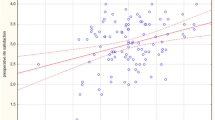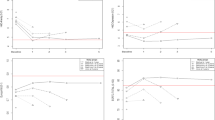Abstract
Introduction
Measurement of quality of life (QoL) is assuming increasing importance in cancer care. Predictors of early postoperative QoL after colorectal cancer resection are not clear and the aim of this study was to identify these factors.
Methods
A consecutive series of eligible patients undergoing elective resection for colorectal cancer were invited to participate. Standardised, reliable and validated psychological questionnaires (HADS, PANAS, MRS, FACT-C, EQ-5D) were administered seven days prior to surgery and then six weeks after discharge.
Results
One hundred and four patients with colorectal cancer were recruited. There were 70 males (67.3%) and the mean age of the group was 67.6 years. Postoperative anxiety and depression were closely related to the preoperative anxiety and depression scores (p < 0.001). Other QoL scores also showed significant correlation with the respective preoperative scores. Anxiety, depression, and FACT functional wellbeing scores were also correlated with the incidence of postoperative morbidity. On multiple regression analysis postoperative morbidity, tumour node metastasis (TNM) stage, presence of stoma and preoperative QoL scores were found to independently predict postoperative QoL scores.
Conclusion
Routine preoperative QoL measurement in cancer patients can identify patients at risk of having a poor QoL postoperatively. Suitable psychological and pharmaceutical intervention can be planned in advance for this group.
Similar content being viewed by others
References
Parkin DM, Bray F, Ferlay J, Pisani P. Estimating the world cancer burden: Globocan. Int J Cancer 2001; 94:153–6
Walker LG, Walker MB, Ogston K, Heys SD, Ah-See AK, Miller ID, Hutcheon AW, Sarkar TK, Eremin O. Psychological, clinical and pathological effects of relaxation training and guided imagery during primary chemotherapy. Br J Cancer 1999; 80:262–8
Wolinsky FD, Unverzagt FW, Smith DM, Jones R, Stoddard A, Tennstedt SL. The ACTIVE Cognitive Training Trial and Health-Related Quality of Life: Protection That Lasts for 5 Years. J Gerontol A Biol Sci Med Sci 2006; 61:1324–9
Antoni MH, Wimberly SR, Lechner SC, Kazi A, Sifre T, Urcuyo KR, Phillips K, Smith RG, Petronis VM, Guellati S, Wells KA, Blomberg B, Carver CS. Reduction of cancer-specific thought intrusions and anxiety symptoms with a stress management intervention among women undergoing treatment for breast cancer. Am J Psychiatry 2006; 163:1791–7
Engel J, Kerr J, Schlesinger-Raab A, Eckel R, Sauer H, Holzel D. Quality of life in rectal cancer patients: a four-year prospective study. Ann Surg 2003; 238:203–13
Camilleri-Brennan J, Steele RJ. Prospective analysis of quality of life and survival following mesorectal excision for rectal cancer. Br J Surg 2001; 88:1617–22
Anthony T, Jones C, Antoine J, Sivess-Franks S, Turnage R. The effect of treatment for colorectal cancer on long-term health-related quality of life. Ann Surg Oncol 2001; 8:44–9
Cella DF, Tulsky DS, Gray G, Sarafian B, Linn E, Bonomi A, Silberman M, Yellen SB, Winicour P, Brannon J. The functional assessment of cancer therapy scale: development and validation of the general measure. J Clin Oncol 1993; 11:570–9
Cella DF, Bonomi AE, Lloyd SR, Tulsky DS, Kaplan E, Bonomi P. Reliability and validity of the functional assessment of cancer therapy-lung (FACT-L) quality of life instrument. Lung Cancer 1995; 12:199–220
van Agt HM, Essink-Bot ML, Krabbe PF, Bonsel GJ. Test-retest reliability of health state valuations collected with the EuroQol questionnaire. Soc Sci Med 1994; 39:1537–44
Essink-Bot ML, Krabbe PF, Bonsel GJ, Aaronson NK. An empirical comparison of four generic health status measures. The Nottingham health profile, the medical outcomes study 36-item short-form health survey, the COOP/WONCA charts, and the EuroQol instrument. Med Care 1997; 35:522–37
Brazier J, Jones N, Kind P. Testing the validity of the EuroQol and comparing it with the SF-36 health survey questionnaire. Qual Life Res 1993; 2:169–80
Zigmond AS, Snaith RP. The hospital anxiety and depression scale. Acta Psychiatr Scand 1983; 67:361–70
Snaith RP, Zigmond AS. The hospital anxiety and depression scale manual. Berkshire, England: NFER-NELSON 1994
Snaith RP, Zigmond AS. The hospital anxiety and depression scale. Br Med J Clin Res Ed 1986; 292:344
Moorey S, Greer S, Watson M, Gorman C, Rowden L, Tunmore R, Robertson B, Bliss J. The factor structure and factor stability of the hospital anxiety and depression scale in patients with cancer. Br J Psychiatry 1991; 158:255–9
Spinhoven P, Ormel J, Sloekers PP, Kempen GI, Speckens AE, Van Hemert AM. A validation study of the hospital anxiety and depression scale (HADS) in different groups of Dutch subjects. Psychol Med 1997; 27:363–70
Watson D, Clark LA, Tellegen A. Development and validation of brief measures of positive and negative affect: the PANAS scales. J Pers Soc Psychol 1988; 54:1063–70
Derogatis LR, Lipman RS, Rickels K, Uhlenhuth EH, Covi L. The Hopkins symptom checklist (HSCL): a self-report symptom inventory. Behav Sci 1974; 19:1–15
Crawford JR, Henry JD. The positive and negative affect schedule (PANAS): construct validity, measurement properties and normative data in a large non-clinical sample. Br J Clin Psychol 2004; 43:245–65
Voogt E, van Der Heide A, van Leeuwen AF, Visser AP, Cleiren MP, Passchier J, van der Maas PJ. Positive and negative affect after diagnosis of advanced cancer. Psychooncology 2005;14(4):262–73
Anderson J, Walker MB, Walker LG. The mood rating scale: a brief, acceptable, reliable and valid state measure of normal mood. Psychooncology 2000; 9:359
Leskela U, Rytsala H, Komulainen E, Melartin T, Sokero P, Lestela-Mielonen P, Isometsa E. The influence of adversity and perceived social support on the outcome of major depressive disorder in subjects with different levels of depressive symptoms. Psychol Med 2006; 36:779–88
Franks P, Campbell TL, Shields CG. Social relationships and health: the relative roles of family functioning and social support. Soc Sci Med 1992; 34:779–88
Allen-Mersh TG, Glover C, Fordy C, Henderson DC, Davies M. Relation between depression and circulating immune products in patients with advanced colorectal cancer. J R Soc Med 1998; 91:408–13
Wilson TR, Alexander DJ, Kind P. Measurement of health-related quality of life in the early follow-up of colon and rectal cancer. Dis Colon Rectum 2006; 49:1692–702
Carr AJ, Gibson B, Robinson PG. Measuring quality of life: Is quality of life determined by expectations or experience? BMJ 2001; 322:1240–3
Arndt V, Merx H, Stegmaier C, Ziegler H, Brenner H. Quality of life in patients with colorectal cancer 1 year after diagnosis compared with the general population: a population-based study. J Clin Oncol 2004; 22:4829–36
Ward WL, Hahn EA, Mo F, Hernandez L, Tulsky DS, Cella D. Reliability and validity of the functional assessment of cancer therapy-colorectal (FACT-C) quality of life instrument. Qual Life Res 1999; 8:181–95
Jess P, Christiansen J, Bech P. Quality of life after anterior resection versus abdominoperineal extirpation for rectal cancer. Scand J Gastroenterol 2002; 37:1201–4
Camilleri-Brennan J, Steele RJ. Objective assessment of morbidity and quality of life after surgery for low rectal cancer. Colorectal Dis 2002; 4:61–6
Grumann MM, Noack EM, Hoffmann IA, Schlag PM. Comparison of quality of life in patients undergoing abdominoperineal extirpation or anterior resection for rectal cancer. Ann Surg 2001; 233:149–56
Author information
Authors and Affiliations
Corresponding author
Rights and permissions
About this article
Cite this article
Sharma, A., Sharp, D.M., Walker, L.G. et al. Predictors of Early Postoperative Quality of Life after Elective Resection for Colorectal Cancer. Ann Surg Oncol 14, 3435–3442 (2007). https://doi.org/10.1245/s10434-007-9554-x
Received:
Revised:
Accepted:
Published:
Issue Date:
DOI: https://doi.org/10.1245/s10434-007-9554-x




